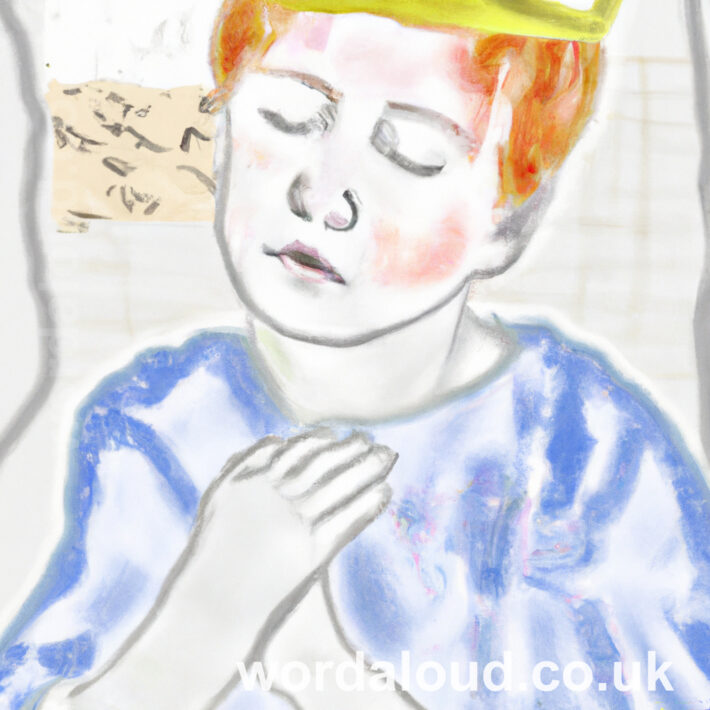Christian Art | Prayer With Jesus | Psalms | Prayer To The Eternal King For Help | King David As A Boy | Audio KJV | Love Revealed By Jesus Christ | King James Audio Bible
Psalm 102 | King James Audio Bible
YouTube: Psalm 102 | KJV | King James Version | Audio Bible | Word Aloud
Psalm 102 explores human vulnerability, search for divine solace, and the resilient thread of hope that persists even in the darkest moments.
The cry is not one of abstract despair but concrete plea: ‘Hear my prayer, O Lord, and let my cry come unto thee.’ The urgency in these words reflects immediacy of the psalmist’s need, a soul laid bare before the divine, seeking solace in the midst of affliction.
The psalmist’s anguish is expressed in verses two and three: ‘Hide not thy face from me in the day when I am in trouble; incline thine ear unto me: in the day when I call answer me speedily. For my days are consumed like smoke, and my bones are burned as an hearth.’ This metaphor of smoke and burned bones describes life dissipating rapidly, the psalmist’s strength waning in crucible of suffering.
Physical and emotional toll of affliction is depicted in verses four and five: ‘My heart is smitten, and withered like grass; that I forget to eat my bread. By reason of the voice of my groaning my bones cleave to my skin.’ Imagery conveys an all-encompassing nature of distress, where even basic sustenance of life is forgotten in the wake of overwhelming sorrow.
Verses six to eleven use metaphors of solitude and desolation to convey the depth of the psalmist’s isolation and relentless assault of adversaries: ‘I am like a pelican of the wilderness: I am like an owl of the desert. I watch, and am as a sparrow alone upon the house top. Mine enemies reproach me all the day; and they that are mad against me are sworn against me.’ The psalmist, likened to birds of solitude, becomes a solitary figure subjected to relentless reproach.
Despite overwhelming despair, the psalm turns in verses twelve and thirteen, with contrast in trust of divine permanence: ‘But thou, O Lord, shalt endure for ever; and thy remembrance unto all generations. Thou shalt arise, and have mercy upon Zion: for the time to favour her, yea, the set time, is come.’ Here, the psalmist shifts from personal distress to acknowledgment of the eternal nature of God and hopeful anticipation of divine intervention in the fate of Zion.
Verses fourteen to sixteen express connection between God’s mercy towards Zion and the impact on the nations: ‘For thy servants take pleasure in her stones, and favour the dust thereof. So the heathen shall fear the name of the Lord, and all the kings of the earth thy glory.’ Restoration of Zion is not mere personal hope but vision with wider implications for the reverence of God among the nations.
The psalmist envisions a future state where the Lord’s glory is revealed in the rebuilding of Zion. This anticipation of divine favor upon Zion is a beacon of hope amid personal suffering, fate of the individual intertwined with a collective destiny of God’s chosen people.
Verses eighteen to twenty-two highlight the psalmist’s conviction that the restoration of Zion will be a testament to God’s faithfulness and a revelation to future generations: ‘This shall be written for the generation to come: and the people which shall be created shall praise the Lord. For he hath looked down from the height of his sanctuary; from heaven did the Lord behold the earth; To hear the groaning of the prisoner; to loose those that are appointed to death; To declare the name of the Lord in Zion, and his praise in Jerusalem; When the people are gathered together, and the kingdoms, to serve the Lord.’
The psalmist’s personal lamentation becomes broader narrative of divine redemption and the enduring impact this will have on generations. Anticipation of God’s intervention transforms the psalm from a cry of despair to declaration of faith in the redemptive power of the Almighty.
Verses twenty-three to twenty-eight return to the personal narrative, expressing the psalmist’s weakened strength and the plea to prolong their days: ‘He weakened my strength in the way; he shortened my days. I said, O my God, take me not away in the midst of my days: thy years are throughout all generations.’ The psalmist, acknowledging personal frailty, implores God not to cut short his days, recognizing the eternal nature of God’s existence.
The psalm turns in verses twenty-nine to thirty-one, highlighting the foundational nature of God’s creation: ‘Of old hast thou laid the foundation of the earth: and the heavens are the work of thy hands. They shall perish, but thou shalt endure: yea, all of them shall wax old like a garment; as a vesture shalt thou change them, and they shall be changed: But thou art the same, and thy years shall have no end.’ In contrast to the transient nature of creation, the psalmist affirms eternal constancy of God.
Concluding verses affirm continuity of God’s legacy and the establishment of the descendants of God’s servants: ‘The children of thy servants shall continue, and their seed shall be established before thee.’ The psalmist, through depths of personal suffering, finds solace in the enduring legacy of those who serve God.

Psalm 102 | King James Audio Bible
Hear my prayer, O Lord, and let my cry come unto thee.
Hide not thy face from me in the day when I am in trouble; incline thine ear unto me: in the day when I call answer me speedily.
For my days are consumed like smoke, and my bones are burned as an hearth.
My heart is smitten, and withered like grass; that I forget to eat my bread.
By reason of the voice of my groaning my bones cleave to my skin.
I am like a pelican of the wilderness: I am like an owl of the desert.
I watch, and am as a sparrow alone upon the house top.
Mine enemies reproach me all the day; and they that are mad against me are sworn against me.
For I have eaten ashes like bread, and mingled my drink with weeping.
Because of thine indignation and thy wrath: for thou hast lifted me up, and cast me down.
My days are like a shadow that declineth; and I am withered like grass.
But thou, O Lord, shalt endure for ever; and thy remembrance unto all generations.
Thou shalt arise, and have mercy upon Zion: for the time to favour her, yea, the set time, is come.
For thy servants take pleasure in her stones, and favour the dust thereof.
So the heathen shall fear the name of the Lord, and all the kings of the earth thy glory.
When the Lord shall build up Zion, he shall appear in his glory.
He will regard the prayer of the destitute, and not despise their prayer.
This shall be written for the generation to come: and the people which shall be created shall praise the Lord.
For he hath looked down from the height of his sanctuary; from heaven did the Lord behold the earth;
To hear the groaning of the prisoner; to loose those that are appointed to death;
To declare the name of the Lord in Zion, and his praise in Jerusalem;
When the people are gathered together, and the kingdoms, to serve the Lord.
He weakened my strength in the way; he shortened my days.
I said, O my God, take me not away in the midst of my days: thy years are throughout all generations.
Of old hast thou laid the foundation of the earth: and the heavens are the work of thy hands.
They shall perish, but thou shalt endure: yea, all of them shall wax old like a garment; as a vesture shalt thou change them, and they shall be changed:
But thou art the same, and thy years shall have no end.
The children of thy servants shall continue, and their seed shall be established before thee.
Psalm 102 | King James Audio Bible
- Lamentation And Desperation: The psalm begins with a poignant cry of distress, reflecting the psalmist’s profound sense of anguish and desperation.
- Physical And Emotional Affliction: Vivid imagery is used to depict the psalmist’s physical and emotional suffering, emphasizing the consuming nature of distress and impact on well-being.
- Solitude And Reproach: Metaphors of solitude and desolation convey the psalmist’s isolation and relentless reproach from adversaries.
- Hopeful Anticipation: Amidst the lamentation, the psalmist introduces a theme of hope, expressing a steadfast belief in the enduring nature of God and anticipating divine intervention, particularly in the restoration of Zion.
- Divine Permanence: The psalmist contrasts fleeting nature of human existence with enduring permanence of God, emphasizing God’s eternal nature and unchanging character.
- Collective Redemption: The psalmist envisions the restoration of Zion not only as a personal hope but as a testimony to God’s faithfulness with broader implications for the nations and future generations.
- Personal Frailty And Divine Legacy: The psalmist acknowledges personal frailty and weakness but finds solace in the eternal legacy of God, affirming that the descendants of God’s servants will continue and be established.
- Transformation Of Despair Into Faith: The psalm moves from a cry of despair to a declaration of faith, expressing transformative power of hope amid suffering.
- Recognition Of God’s Creation: A reflective acknowledgment of God’s role as the foundation of the earth, contrasting the transient nature of creation with eternal constancy of God.
- Continuity Of God’s Legacy: The psalm concludes by affirming continuity of God’s legacy, highlighting the establishment of the descendants of God’s servants as a testament to God’s enduring presence.








